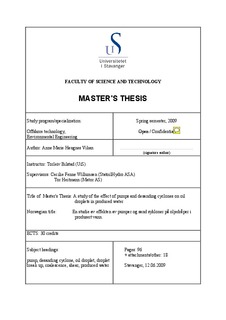| dc.contributor.author | Vikan, Anne Marie Haugnes | |
| dc.date.accessioned | 2011-11-08T12:39:03Z | |
| dc.date.available | 2011-11-08T12:39:03Z | |
| dc.date.issued | 2011 | |
| dc.identifier.uri | http://hdl.handle.net/11250/182495 | |
| dc.description | Master's thesis in Environmental engineering | no_NO |
| dc.description.abstract | The production of petroleum resources includes co-producing water. This water contains oil
products and needs to be treated before discharge to sea or re-injection into the reservoir. The
amount of produced water increases with the age of a field, as does often the amount of solids.
The pressure of the reservoirs will decrease with time.
The primary equipment for treating produced water is the hydro cyclone. It’s operated with a
lower limit with regards to oil droplet size of ~10 μm although smaller oil droplets have been
experienced to separate. The hydro cyclone requires a certain differential pressure to perform
at its maximum efficiency, and it is sensitive to solids. To protect the hydro cyclone a
desanding cyclone could be installed upstream the hydro cyclone. A pump is often used to
pressurize the water if necessary. The effect that this equipment has on the oil-water
separation is a topic being discussed in the industry.
The development in the industry, with increasing the life lengths of the fields and the need for
development in areas of more stringent requirements, will benefit more knowledge regarding
the effect of pumps and desanding cyclones on the oil- water separation.
This thesis deals with these issues and presents the knowledge that exists with regards to
pumps and desanding cyclones and their effect on oil droplet coalescence and break-up. This
research has been done through contacts with suppliers, literature studies and evaluation of
available test data related to this equipment.
The literature survey and contacts with pump suppliers reveal that little work has been done to
identify any effect of the pumps on the oil droplets. Both the literature survey and the
suppliers agree that the eccentric screw pump generates the least droplet break-up, and that
the centrifugal pump creates more shearing than other pump types.
The offshore tests of centrifugal pumps and twin screw pumps indicate that the twin screw
pump is gentler to the oil droplets than the centrifugal pump. While the tests of the centrifugal
pumps indicate that increasing differential pressure increases droplet break-up, the twin screw
pumps do not show such correlation. This indicates that the twin screw pump is more suitable,
with regards to oil droplet sizes, for boosting the produced water to a hydro cyclone. The literature survey and the contacts with the desanding cyclone suppliers reveal that little
work has been done to identify any effect of the desanding cyclone on the oil droplets. The
experience of the suppliers is that the desanding cyclone gives coalescence, while the one
revealed test show that the desanding cyclone isn’t damaging to the downstream separation.
The offshore tests indicate that the desanding cyclone create coalescence or an insignificantly
degree of break up and will not damage the oil removal performance of the downstream
equipment. | no_NO |
| dc.language.iso | eng | no_NO |
| dc.publisher | University of Stavanger, Norway | no_NO |
| dc.relation.ispartofseries | Masteroppgave/UIS-TN-IMN/2009; | |
| dc.subject | teknisk miljøvern | no_NO |
| dc.subject | offshore teknologi | no_NO |
| dc.subject | desanding cyclone | no_NO |
| dc.subject | oil droplet | no_NO |
| dc.subject | coalescence | no_NO |
| dc.subject | produced water | no_NO |
| dc.subject | droplet break up | no_NO |
| dc.subject | pump | no_NO |
| dc.title | A study of the effect of pumps and desanding cyclones on oil droplets in produced water | no_NO |
| dc.type | Master thesis | no_NO |
| dc.subject.nsi | VDP::Technology: 500::Environmental engineering: 610 | no_NO |
